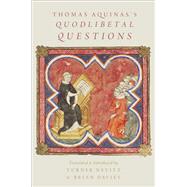
Thomas Aquinas's Quodlibetal Questions
by Nevitt, Turner; Davies, BrianBuy New
Rent Textbook
Rent Digital
Used Textbook
We're Sorry
Sold Out
Summary
Author Biography
Brian Davies is Distinguished Professor of Philosophy at Fordham University. He is the author of many books, including Thomas Aquinas's Summa Contra Gentiles: A Guide and Commentary (OUP, 2016).
Turner Nevitt is Assistant Professor of Philosophy at the University of San Diego. His work has appeared in such journals as The Thomist and History of Philosophy Quarterly.
Table of Contents
Preface
Note on the Translation
Introduction
Quodlibet I
Question 1: God's Divine Nature
Question 2: God's Assumed Human Nature
Question 3: Angels
Question 4: Human Nature
Question 5: Contrition
Question 6: Confession
Question 7: Relating to Clerics
Question 8: Relating to Religious
Question 9: Sin
Question 10: Glory
Quodlibet II
Question 1: Christ
Question 2: The Composition of Angels
Question 3: The Time of the Movement of Angels
Question 4: Virtues Related to Divine Matters
Question 5: Virtues Related to Human Matters
Question 6: Sins
Question 7: Punishments for Sins
Question 8: Forgiveness of Sins
Quodlibet III
Question 1: God's Divine Nature
Question 2: God's Assumed Human Nature
Question 3: Angels
Question 4: Teachers of Sacred Scripture
Question 5: Becoming a Religious
Question 6: Being a Religious
Question 7: Relating to the Laity
Question 8: The Soul's Substance
Question 9: The Soul's Knowledge
Question 10: The Soul's Punishment
Question 11: The Body
Question 12: Conscience
Question 13: Penance
Question 14: Purely Bodily Creatures
Quodlibet VI
Question 1: God
Question 2: Angels
Question 3: The Sacrament of Baptism
Question 4: Faith
Question 5: Relating to Religion or Worship
Question 6: Obedience
Question 7: Alms Given by Clerics
Question 8: Alms Given on Behalf of the Dead
Question 9: Sins
Question 10: Bodily Things
Question 11: Purely Bodily Creatures
Quodlibet IV
Question 1: God's Knowledge
Question 2: God's Power
Question 3: The Extent of God's Power
Question 4: The Son's Divine Nature
Question 5: The Son's Assumed Nature
Question 6: Grace
Question 7: The Sacraments of Grace
Question 8: Human Acts Related to Superiors and Prelates
Question 9: Human Acts Related to the Intellect
Question 10: The Act of Martyrdom
Question 11: Evil Acts
Question 12: The Religious Life
Quodlibet V
Question 1: God's Knowledge
Question 2: God's Power
Question 3: God's Assumed Nature
Question 4: Angels
Question 5: Human Nature
Question 6: The Sacrament of the Eucharist
Question 7: The Sacrament of Penance
Question 8: The Sacrament of Marriage
Question 9: Relating to the Virtues
Question 10: Relating to the Commandments
Question 11: Relating to Prelates
Question 12: Relating to Teachers
Question 13: Relating to Religious
Question 14: Relating to Clerics
Quodlibet VII
Question 1: The Knowledge of Spiritual Substances
Question 2: The Enjoyment of Christ's Soul During the Passion
Question 3: The Plurality of Spiritual Substances
Question 4: The Sacrament of the Altar
Question 5: The Bodies of the Damned
Question 6: The Senses of Sacred Scripture
Question 7: Manual Labor
Quodlibet VIII
Question 1: The Divine Ideas
Question 2: The Human Soul
Question 3: The Human Body
Question 4: Matters of Grace Related to Prelates
Question 5: Matters of Grace Related to Everyone
Question 6: Sin
Question 7: The Spiritual Punishment of the Damned
Question 8: The Bodily Punishment of the Damned
Question 9: The Glory of the Blessed
Quodlibet IX
Question 1: Christ's Divine Nature
Question 2: The Union of Christ's Human and Divine Natures
Question 3: The Outward Appearances Containing Christ in the Sacrament of the Altar
Question 4: Angels
Question 5: Human Nature
Question 6: Grace
Question 7: Sin
Question 8: Glory
Quodlibet X
Question 1: God
Question 2: Angels
Question 3: The Soul's Substance
Question 4: The Soul's Activity
Question 5: Matters of Grace Related to Commandments and Counsels
Question 6: Sins Opposed to Right Action
Question 7: Sins Opposed to Right Faith
Question 8: Glory
Quodlibet XI
Question 1: God's Infinity
Question 2: God's Knowledge
Question 3: God's Predestination
Question 4: Angels
Question 5: The Human Soul
Question 6: The Human Body
Question 7: The Sacrament of Confirmation
Question 8: The Sacrament of the Eucharist
Question 9: The Sacrament of Marriage
Question 10: Fraternal Correction
Quodlibet XII
Question 1: God's Existence
Question 2: God's Power
Question 3: God's Predestination
Question 4: Angels
Question 5: The Heavens
Question 6: The Human Soul
Question 7: Human Knowledge
Question 8: Consequences of Human Knowledge
Question 9: The Sacrament of Baptism
Question 10: The Sacrament of Penance
Question 11: An Effect of the Sacraments
Question 12: The Identity of the Church
Question 13: The Intellectual Virtue of Truth
Question 14: The Moral Virtues
Question 15: Restitution
Question 16: The Office of Commentators on Sacred Scripture
Question 17: The Office of Preachers
Question 18: The Office of Confessors
Question 19: The Office of Vicars
Question 20: Original Sin
Question 21: Actual Sins of Thought
Question 22: Actual Sins of Action
Question 23: Punishments
Abbreviations
Parallel Passages
Glossary of Terms
Glossary of Authors and Works Cited
Notes
Index
An electronic version of this book is available through VitalSource.
This book is viewable on PC, Mac, iPhone, iPad, iPod Touch, and most smartphones.
By purchasing, you will be able to view this book online, as well as download it, for the chosen number of days.
Digital License
You are licensing a digital product for a set duration. Durations are set forth in the product description, with "Lifetime" typically meaning five (5) years of online access and permanent download to a supported device. All licenses are non-transferable.
More details can be found here.
A downloadable version of this book is available through the eCampus Reader or compatible Adobe readers.
Applications are available on iOS, Android, PC, Mac, and Windows Mobile platforms.
Please view the compatibility matrix prior to purchase.
